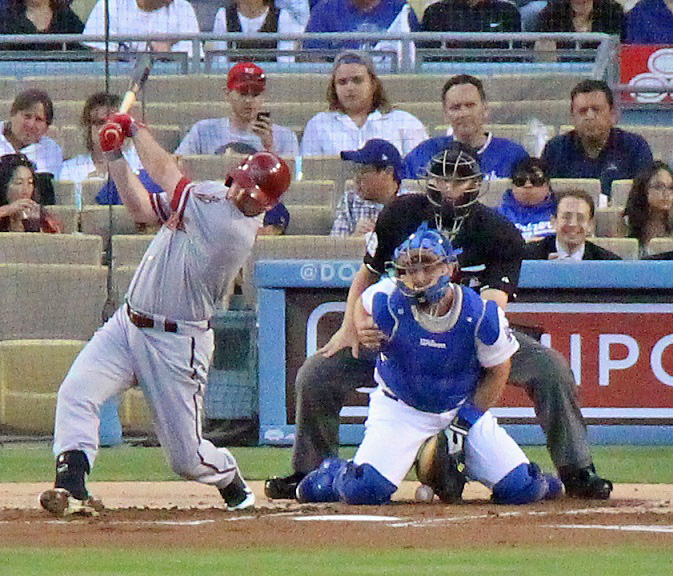As a lifelong student of the game of baseball, I frequently find myself paying extra close attention to the little details that occur during a game that may go unnoticed by the casual fan – like how many times a catcher blocks a ball in the dirt in such a way that it prevents runners on base from advancing. Now this is certainly not to say that blocking balls in the dirt isn’t important, in fact it is huge (especially with a runner on third base), but it is something that is almost taken for granted by most fans – unless of course the ball gets away from the catcher and the run scores or the base runners advance into scoring position.
While there are many catchers in the game who are good at blocking balls in the dirt, the truth of the matter is that there are only a handful who are great at it; and according to one former catcher, who also just so happens to be a former MLB manager, Dodger catcher Tim Federowicz is the best defensive catcher in the National League.

During the course of a game, a catcher will usually make anywhere from 10-20 blocks of balls in the dirt – and nobody does it better than Dodger catcher Tim Federowicz.
(Photo credit – Ron Cervenka)
“I think Tim Federowicz is the best defensive catcher in the National League and this includes Yadier Molina and Buster Posey,” said Kevin Kennedy, a former catcher and former manager of the Boston Red Sox and Texas Rangers. “His technique is perfect. If the ball is to his left he goes down left knee first and slides over and his right knee covers up and he brings it back to center, and if the ball is to his right he goes down right knee first and slides over and his left knee covers up.
“A lot of (former Dodger catchers) never did this, including Russell Martin,” added Kennedy. “This was always confusing to me with his manager being a former catcher; this was pre-Yeager (as the Dodgers catching instructor) by the way. Russ would go down on his left knee on balls to his right and go down on his right knee on balls to his left. When he did this his upper half goes away and when the ball hit (his chest protector) it would go away instead of bearing it back to center. If you do this, you’re exposed… you’re open and the ball bounces away from you,” explains Kennedy.
Prior to Monday night’s game against the Diamondbacks I asked Federowicz where he learned his excellent foot work and blocking skills.
“I wasn’t a very good defensive catcher coming up in the minor leagues in the Boston organization,” admitted the 25-year old Erie, Pennsylvania native. “My coach was Gary Tuck who is one of the best catching coaches in the game. The Red Sox have always been known for their great defensive catchers and Gary worked with me a lot and helped me develop my defensive skills. I also spent a lot of time watching other catchers, especially Jason Varitek, who was a great defensive catcher,” added FedEx.
When I pointed out to Tim that I noticed that he seemed to alter his squat whenever the count went to two strikes or whenever there were runners on base (especially on third base), he said that he does this to be in a better position to block balls.
“I always lean forward on my toes whenever there are two strikes or whenever there are runners on base so that I can react quickly to blocked balls,” said Federowicz. “If I didn’t do this, the run might score or the runners might advance if the ball gets past me. I have always taken pride in my defensive skills,” he added.
As expected, Kennedy noticed this too.
“Gary Tuck is the catching instructor (in Boston) and one thing that he did was take his catchers out every day before the game and work with them, even the veteran catchers like Varitek,” said Kennedy. “He would have them block a few balls and get them ready to play that night. He worked with his catchers constantly and part (of why Federowicz is as good as he is) is because of Gary and part of it was working with Varitek, who was excellent at blocking balls.
“I think Steve Yeager has been a big part of it too,” added Kennedy. “I had a nice talk with Steve last week about his routine and about how hard both A.J. and Federowicz work. They did it in spring training and they do it now in the bullpen. Yeager does a lot of things (with his catchers) that people don’t see.”
I asked Federowicz if it was frustrating being sent back and forth from the Dodgers to Triple-A Albuquerque.
“It’s all part of it and one of those things that I have no control over,” says Federowicz. “I know that I’ll probably be sent back down when A.J. returns. I’m just going to keep working hard… work on my hitting and hopefully things will work out.”

FedEx knows that he will most likely be sent back down to Triple-A Albuquerque when A.J. Ellis returns from the DL later this week.
(Photo credit – Ron Cervenka)
It’s pretty hard not to pull for a guy with this type of attitude. It is also reassuring to know that Tim Federowicz will be back up to the majors soon because it does the Dodgers little good to keep the best defensive catcher in the National League in the minor leagues.
* * * * * * * *
Author’s Note:
It would be negligent of me not to mention Federowicz’s exciting bases clearing double in the bottom of the 8th inning of Tuesday night’s game against the Diamondbacks giving the Dodgers a much needed 5-3 win to end a three-game losing streak.

Federowicz’s 8th inning bases clearing double was poetic justice in a game in which D-backs pitcher Ian Kennedy intentionally hit two Dodger players in the head.
(Photo credit – Jon SooHoo)




 June 12th, 2013 at 6:00 am
June 12th, 2013 at 6:00 am  by Ron Cervenka
by Ron Cervenka  Posted in
Posted in 

@Think_BlueLA A friend from NC went to HS with him, love him as a Dodger
Nice article. I like Federowicz. He looks like a ball player and plays hard. I hope his hitting keeps coming on.
Ron, as you well know my daughter is soon to be off to college on a softball scholarship and she’s a catcher. I have spent thousands of dollars over the years for private hitting, fielding and catching lessens and I can tell you first hand that this article hits the most important skill set all catchers will be judged by first and foremost. My daughter wasn’t a catcher by choice, she was pressed into the position several years back when her travel ball coach (ME) needed a kid that wasn’t afraid to give it her best. From that point she realized it was and is the hardest position in all of softball / baseball and she loved it. It takes a very special kind of kid to learn how to do it right. This spring training, while getting AJ’s autograph I told him my daughter was a catcher and as a parent I’d kill to have all the money I’ve spent on catching lessens. He looked me in the eye and said so did his parents and then said thank you for acknowledging the effort it takes. I hope you don’t mind but I copied this article and sent it off to my daughter and her catching coach.
Fabulous article, Ron! Once again, a great angle you won’t see anywhere else.
Having a great blocking catcher gives pitchers confidence to throw the all-important pitch in the dirt. Instead of the obligatory high 0-2 pitch you can mix it up and throw a bouncer that will fool many. If Fedex can give the pitcher the extra confidence that he can block that pitch out of the zone, it bodes well for his career.
Hopefully he will be able to hit quite well in MLB. However, Steve Yeager had a great career as a .229 career hitter and is considered to have been a very good catcher because of his defensive capabilities.